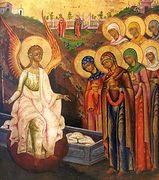
Epistle: Acts 6:1-7
Gospel: Mark 15:43-47; 16:1-8
Christ is Risen!
Sometimes you will hear Orthodox Christians contrast what they call our “therapeutic” understanding of salvation with the “forensic” model in the West. There are two problems with this.
First, it reflects a basic lack of understanding of the broad sweep of how the Church—East and West, Greek and Latin—have understood salvation. To say that our own understanding is exclusively, or even primarily, therapeutic is simply factually wrong. Beginning with the New Testament, the Tradition of the Church uses both therapeuticand forensic imagery to explain salvation and our new life in Christ.
Second, and more serious problem, is that people make this contrast because they see justice and mercy as opposed to each other. How often have we heard—or said—we are the Church of mercy, not justice?
Now if by “justice” we mean revenge, then this is true as far as we go. We are not a community that seeks revenge. And we don’t because while vengeance belongs to God alone, God in Jesus Christ makes clear that He doesn’t seek revenge against us for our sins. Instead, He offers us forgiveness and healing.
But, as the readings this morning make clear, justice and mercy presuppose each other and both are essential to our life in Christ. Let me explain.
We read in Acts of the Apostles of a conflict, one rooted in differences of ethnicity, language and culture as it happens, that arose in response to how the Church cared for two groups of widows. While both groups were Jewish converts to Christianity, the Greek-speaking widows complained that they were not being treated as well as were the Hebrew-speaking widows. There arose a complaint against the Hebrews by the Hellenists, because their widows were neglected in the daily distribution (v. 1). That the daily distribution of food is an act of charity, of mercy if you will, doesn’t prevent the Greek-speaking members of the community (“the Hellenists”) from complaining that they are being treated unjustly. Far from invalidating the demands of justice, mercy presupposes justice.
If I disregard or violate the demands of justice, my actions simply are not merciful. To see this, look at the Hellenists’ complaint and, more importantly, from the Apostles’ response. The Apostles don’t say to the Hellenists that their complaints are an offense against mercy. There is, in fact, a real injustice being committed and resolving it is necessary for mercy to reign in the Church.
Notice, as well, how the Apostles resolve the situation. Again, while they take the complaint seriously, they are also clear that God has not set them aside to care for the philanthropic life of the Church but to preach. It is not desirable that we should leave the word of God and serve tables (v. 2). So what do they do instead? They create a new ministry within the Church to oversee this business (v.3).
This is an odd response if the Church is only concerned with mercy. When faced with a real sin against justice, the Apostles don’t call people to repentance or to pray more. No, what they do is add a level to the hierarchy of the Church. Like Moses in Exodus, the Apostles realize that they can’t do what God asked them to do—preach the Gospel and govern the Church—on their own. They need help to govern the Church, they need help to be faithful to their own vocation: brethren, seek out from among you seven men of good reputation, full of the Holy Spirit and wisdom, whom we may appoint over this business; but we will give ourselves continually to prayer and to the ministry of the word” (vv. 3-4).
It’s also worth noting, if only in passing, how the Apostles went about ordaining the first deacons. They didn’t impose leaders on the Church. Instead, they consulted the faithful. Fulfilling the demands of justice requires that we actively collaborate with those whose lives our decisions effect. In other words, if mercy requires justice, justice requires that we respect the autonomy of others. We are to relate to each other as co-workers in Christ each with our own proper area of competence and responsibility.
But justice prepares the way for mercy in another way.
It would have been enough, turning now to the Gospel, if the disciples had buried Jesus in “the potter’s field” (see Matthew 27:3-9). This is all that justice demanded of them. But notice what happens. The disciples, having been instructed in what justice demands, do more than justice requires. Instead of doing the minimum they freely offer what only mercy can provide—the sacrifice of themselves on behalf of another.
Look at Joseph of Arimathea. John’s Gospel describes him as a disciple of Jesus, but secretly for fear of the Jews (John 19:38). Fearful though he is, he nevertheless went to Pilate, and asked for the body of Jesus (Mark 15:43). He then proceeds to purchase fine linen in which to wrap Jesus and places His Body in a tomb which had been hewn out of the rock (Mark 15:46). Together with Nicodemus, who at first came to Jesus by night, he anoints the Body with a mixture of myrrh and aloes, about a hundred pounds (John 19:39). Two fearful men become courageous disciples who, like the Lord Jesus Christ, are willing to stand before Pilate and testify to the Kingdom of God.
Likewise, with the Myrrh-bearing women. Very early in the morning, on the first day of the week, they came to the tomb when the sun had risen. And they said among themselves, ‘Who will roll away the stone from the door of the tomb for us?' (Mark 16:2-3) When in mercy they go to the Tomb they discover that “Christ is Risen from the dead” and that “Death has been trampled down by death!” Justice prepares them to be merciful and mercy reveals to them the glory of the Resurrection.
My brothers and sisters in Christ, far from being opposed, justice and mercy require each other. Without mercy, the pursuit of justice becomes harsh and unyielding; without justice, however, mercy becomes mere sentimentality and leads me to collude with evils great and small.
But justice and mercy are meant to support each other. More than that, they prepare us to receive Christ and to shape our lives according to His commandments (John 14:15). To paraphrase today’s prokeimenon, justice and mercy must kiss. This happens when I take to heart the words of the Prophet Micah He has shown you, O mortal, what is good. And what does the Lord require of you? To act justly and to love mercy and to walk humbly with your God (Micah 6:8).
In the words of our father among the saints, Herman of Alaska: "for our good and for our happiness, let us all make a vow: at least from this day, this hour, this very minute, we should strive to love God above all else and do His will!” Let us, in other words, commit ourselves to act justly, to love mercy and work humbly with our God!
Christ is Risen!



